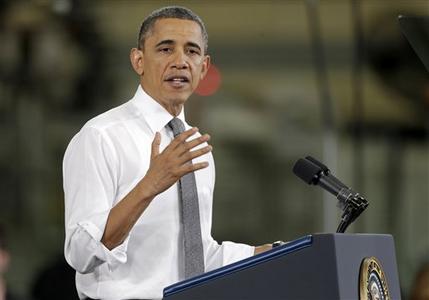WASHINGTON (AP) — President Barack Obama’s ambitious plan to expand preschool programs comes as one out of every 13 students already in Head Start classrooms is at risk of being kicked out if lawmakers don’t sidestep a budget meltdown.

Obama was set to talk about enlarging early childhood education programs such as Head Start during a stop Thursday in Georgia. Education Secretary Arne Duncan, meanwhile, was set to tell senators on Capitol Hill that the pending budget cuts could be devastating to current students.
Obama’s team is warning Congress – and lawmakers’ constituents – what is expected to happen if leaders fail to avert $85 billion in automatic budget cuts set to begin March 1. With the cuts looming, the administration has increased its pressure on lawmakers, and Obama’s State of the Union address Tuesday made clear he was not looking for compromise as he began his second term.
“I propose working with states to make high-quality preschool available to every child in America,” Obama told Congress and a national television audience.
Obama left out key details of his proposal, including the cost to the federal or state governments. Administration officials said ahead of Tuesday’s speech that the proposal would include federal financial incentives to assist states.
Administration officials on Wednesday would not offer specifics on what’s next for almost 1 million Head Start students who are served each year through the $8 billion program.
Obama’s aides stressed that the new programs would not add to the nation’s nearly $16.5 trillion debt.
“The last budget had over $1.5 trillion of mandatory and revenue savings, things like reductions in entitlements, closing loopholes,” Jason Furman, a deputy director at the National Economic Council, told reporters Wednesday.
Furman said the new initiatives would be smaller and promised Obama would outline the details when he sends his 2014 budget proposal to Congress next month.
Ahead of that, the White House and Congress are weighing whether to let the deep automatic spending cuts to take hold on March 1. If that happens, some 10,000 teachers could be out of work and 70,000 students could be kicked out of Head Start programs, the White House has warned.
The cuts would also force an additional 14,000 Head Start workers to be laid off and would mean 1.2 million students from low-income families would have their schools’ funding cut. Washington also would stop paying its share of 7,200 special needs educators’ salaries.
The federal government doesn’t directly pay the salaries of those workers but sends money to states based on the number of students in specific categories, such as those with learning disabilities or from at-risk communities. The states generally dole out those dollars to the individual districts based on the schools’ share of those students.
The automatic, across-the-board budget cuts were designed to kick in only if lawmakers failed to reach a broad agreement to reduce the nation’s debt.
“Should these cuts occur, they would be harmful not only to our agency, but to critical domestic and defense priorities across the government and across the country,” Duncan told Education Department employees last week, warning they might be forced to take unpaid leave to deal with the budget crunch.
If the White House wants to move ahead with its pre-kindergarten plan, officials are going to need help from the states to provide political cover and dollars alike. House Speaker John Boehner said Thursday that involving the federal involvement in early childhood education was “a good way to screw it up.” The Republican chairman of the House committee overseeing education policy was cool toward the proposal and was unlikely to approve new spending on it. And even Obama’s allies acknowledged there was little Washington could do without governors’ help.
“We can all agree on the importance of ensuring children have the foundation they need to succeed in school and in life,” said Rep. John Kline, R-Minn., chairman of the House Education and the Workforce Committee. “However, before we spend more taxpayer dollars on new programs, we must first review what is and is not working in existing initiatives, such as Head Start.”
Republicans and conservatives have questioned the effectiveness of Head Start programs, citing studies such as a Health and Human Services report last year that showed that while at-risk students enrolled in the pre-kindergarten programs saw tremendous gains in vocabulary and social development, those benefits largely faded by the time students reached third grade.
The HHS report didn’t explain why the students saw a drop-off in performance or predict how they would fare as they aged. But it was a favorite reason to question Obama’s plan.
“There’s reason for huge skepticism,” said Mike Petrilli, the executive vice president of the Thomas B. Fordham Institute, a conservative education think tank. “Most states are still in a ditch financially and it’s going to be a couple years before they’re out of it. … I don’t know where the states are going to come up with the money for this.”
Scores of other studies, however, were more favorable on the program that has shown to make at-risk students more likely to complete high school and avoid criminal arrests. In pure dollars and cents, academics called it a smart investment.
Advocates for more early childhood education said states already are working to help the most at-risk students and could be willing partners for Obama if it was worth leaders’ time.
“There is no way to work on the scale he’s describing without engaging with states and partnering with states,” said Kris Perry, executive director of the First Five Years Fund, which advocates early education programs for at-risk children. “He’s going to have to work on both sides of the aisle. He has the strength of great evidence but he’ll need help from everyone to get this through.”





